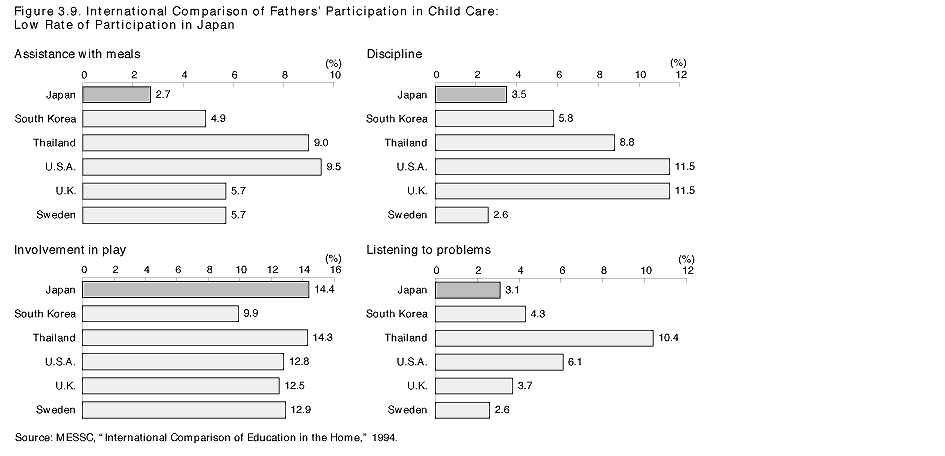| Home > Policy > White Paper, Notice, Announcement > White Paper > JAPANESE GOVERNMENT POLICIES IN EDUCATION, SCIENCE, SPORTS AND CULTURE 1996 > Priorities and Prospects for a Lifelong Learning Society Chapter 3 Section 3 1 | ||
The family is the child's first environment for development, and parents play an extremely important role in ensuring healthy growth. The task of parents is to instill zest for living appropriate to children's stage of development so that they can live positively in a changing society. This includes providing basic discipline in moves, cultivating children's emotional life, and helping them develop social skills and other life skills. The purpose of education in the home is thus to develop the basic qualities and abilities children require for zest for living through family interaction, beginning with parent-child bonding in children's infancy. This is the starting point for all other education.
Concern has been voiced about the declining educational function of the family in recent years, however. This tendency reflects a number of factors, including the trend toward fewer children, the advance of women into the work force, and the slow pace of efforts to create systems that allow caregivers to combine work with child care. Another problem is lack of experience on the part of parents. Some experts regard this situation as one cause of such problems as bullying, refusal to attend school, and violent behavior at home.
In 1994 MESSC commissioned groups involved in this area to conduct an international comparative survey of home education. The survey yielded a number of findings about Japan. First, the level of fathers' participation in home education is low ( Figure 3.9 ). Second, children are not learning basic mores and the discipline needed for self-reliance. Third, child care tends to be limited to close relatives, such as parents and siblings; child-care networks do not extend into the wider community. These results indicate that home education needs to be enhanced in order to foster the ability and motivation to learn during childhood.
It is important that families fulfill their responsibilities, realizing that it is the task of parents to provide children with the basic qualities and abilities that constitute zest for living. To support the improvement of the educational function of the family, the central and local governments need to make further efforts to establish the necessary conditions. It is also important for society as a whole to create an environment in which the family is valued, and which provides "room to grow" (yutori) for father-child interaction. It is hoped that the business community will contribute in this area.
The fifteenth Central Council for Education emphasizes the need to revitalize the educational functions of the family in order to promote the healthy growth of young people. Its deliberations have led to the conclusion that the basic direction of education should be the development of children's zest for living by families, schools, and entire communities. In its recommendations the council calls for improvements to the environment in which children are reared, including the creation of structures that enable families, schools, and communities to work together to support healthy growth; the provision of more opportunities for parents and children to share experiences; the improvement of advisory systems on home education; and the development of home education support groups. The need to improve home education, provide time for home education, and foster cooperation among families, communities, and schools is also highlighted in the 1995 report of the Economic Council's Subcommittee on Next Age Human Resources, which examines future human resource development issues.

| Back to Top | MEXT HOME |